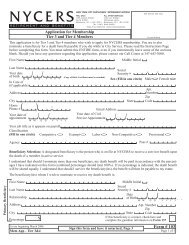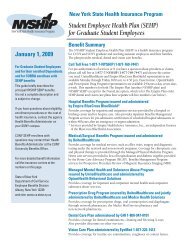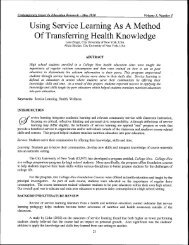Chemical Hygiene Plan - Queensborough Community College ...
Chemical Hygiene Plan - Queensborough Community College ...
Chemical Hygiene Plan - Queensborough Community College ...
You also want an ePaper? Increase the reach of your titles
YUMPU automatically turns print PDFs into web optimized ePapers that Google loves.
vaccine. The Exposure Control <strong>Plan</strong> calls for engineering controls, work practices and<br />
procedures for housekeeping, medical evaluations, hazard communication, and recordkeeping.<br />
Employers are also required to provide employees training at the time of initial assignment to a<br />
job with occupational exposure. The training should be provided during working hours and at no<br />
cost to the employee. Employees must be retrained annually and additional training should be<br />
offered any time that existing tasks are modified or new tasks are required which affect the<br />
worker’s occupational exposure. Training records must be maintained for a minimum of three<br />
years.<br />
Although no vaccine exists for the HCV and HIV, a vaccine does exist for the Hepatitis B Virus<br />
(HBV). Employers are required to offer the vaccine within 10 working days of initial<br />
assignment to all employees at risk of exposure. The vaccination must be performed free of<br />
charge and at a reasonable time and place, and it must be given by a licensed healthcare<br />
professional. Employees who decline the vaccination must sign a declination form. If the<br />
employee initially declines but later decides to accept the vaccination, it must be provided.<br />
It is the responsibility of P.I.s and laboratory supervisors to ensure that personnel<br />
working in laboratories under their supervision have been provided with the<br />
proper training, have received information about the hazards in the laboratory<br />
they may encounter, and have been informed about ways they can protect<br />
themselves.<br />
16.4 Select Biological Agents and Toxins<br />
“Select agents and toxins” are biological agents and toxins that have the potential to pose a<br />
severe threat to public health and safety, and animal or plant health. The possession and use of<br />
these agents is highly regulated. See the National Select Agent Registry website for more<br />
information. This registry is jointly maintained by the CDC and the Animal <strong>Plan</strong>t Health<br />
Inspection Service (APHIS) of the United States Department of Agriculture (USDA). If you<br />
wish to work with these agents, you must first notify and register with your EHS Office.<br />
Unregistered possession and use can result in significant fines and jail time.<br />
16.5 Animal Use<br />
It is a violation of federal regulations to carry out studies using vertebrate animals without an<br />
approved animal use protocol or to maintain animals after expiration of a previously approved<br />
protocol. Federal regulations mandate the establishment of an Institutional Animal Care and Use<br />
Committee (IACUC) to provide guidance, to oversee the animal care and use program, and to<br />
ensure compliance with applicable laws, regulations, and policies. The IACUC oversees the<br />
animal use program as mandated by the United States Public Health Service Policy and Animal<br />
Welfare Act.<br />
Federal regulations and standards stipulate that personnel must be trained so they are qualified to<br />
perform research on animals. Each college is given the responsibility for providing training to<br />
perform research on animals, and as the self-regulating unit of the institution for animal research,<br />
109
















